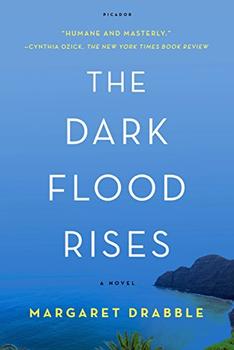Summary | Excerpt | Reviews | Beyond the Book | Readalikes | Genres & Themes | Author Bio

Excerpt
The Dark Flood Rises
She has often suspected that her last words to herself and in this world will prove to be 'You bloody old fool' or, perhaps, depending on the mood of the day or the time of the night, 'you fucking idiot'. As the speeding car hits the tree, or the unserviced boiler explodes, or the smoke and flames fill the hallway, or the grip on the high guttering gives way, those will be her last words. She isn't to know for sure that it will be so, but she suspects it. In her latter years, she's become deeply interested in the phrase 'Call no man happy until he is dead.' Or no woman, come to that. 'Call no woman happy until she is dead.' Fair enough, and the ancient world had known women as well as men who had met unfortunate ends: Clytemnestra, Dido, Hecuba, Antigone. Though of course Antigone, one must remember, had rejoiced to die young, and in a good (if to us pointless) cause, thereby avoiding all the inconveniences of old age.
Fran herself is already too old to die young, and too old to avoid bunions and arthritis, moles and blebs, weakening wrists, incipient but not yet treatable cataracts, and encroaching weariness. She can see that in time (and perhaps in not a very long time) all these annoyances will become so annoying that she will be willing to embark on one of those acts of reckless folly that will bring the whole thing to a rapid, perhaps a sensational ending. But would the rapid ending cancel out and negate the intermittent happiness of the earlier years, the long struggle towards some kind of maturity, the modest successes, the hard work? What would the balance sheet look like, at the last reckoning?
It was the obituaries of Stella Hartleap that set her thoughts in this actuarial direction, as she drove along the M1 towards Birmingham, at only three or four miles above the speed limit.
The print obituaries had been annoying, piously annoying, in a sexist, ageist, hypocritical, mealy-mouthed manner, reeking of Schadenfreude. And just now, yet another mention of Stella on the car radio, in that regular Radio 4 obituary slot, has revived her irritations. She hadn't known Stella very well, having met her late in the day in Highgate through Hamish, but she'd known her long enough to recognise the claptrap and the bullshit. So, Stella had died of smoke inhalation, having set her bedclothes on fire while smoking in bed in her remote farmstead in the Black Mountains, and having just polished off a tumbler of Famous Grouse. So what? A better exit than dying in a hospital corridor in a wheelchair while waiting for another dose of poisonous chemotherapy, which had recently been her good friend Birgit's dismal fate. At least Stella had nobody to blame but herself, and although the last minutes couldn't have been pleasant, neither had Birgit's. Not at all pleasant, by all accounts, and without any complementary frisson of autonomy.
Birgit wouldn't have approved of Stella Hartleap's end. She might even have been censorious about it. She had been a judgmental woman. But that was neither here nor there. We don't have to agree with anyone, ever.
Her new-old friend Teresa, who is grievously ill, wouldn't be censorious, as she is never censorious about anyone.
I am the captain of my fate, I am the master of my soul. A Roman, by a Roman, valiantly vanquished.
There is a truck, too close behind her, she can see its great dead smeared glass underwater eyes looming at her in her driving mirror. In the old days, Hamish used to slam on his brakes in situations like this, as a warning. She'd always thought that was dangerous, but he'd never come to any harm. He hadn't died at the wheel. He'd died of something more insidious, less violent, more cruelly protracted.
She chooses the accelerator. It's safer than the brake. Her first husband Claude had believed in the use of the accelerator, and she was with him on that.
Excerpted from The Dark Flood Rises by Margaret Drabble. Copyright © 2017 by Margaret Drabble. Excerpted by permission of Farrar, Straus & Giroux. All rights reserved. No part of this excerpt may be reproduced or reprinted without permission in writing from the publisher.




When I get a little money I buy books...
Click Here to find out who said this, as well as discovering other famous literary quotes!
Your guide toexceptional books
BookBrowse seeks out and recommends the best in contemporary fiction and nonfiction—books that not only engage and entertain but also deepen our understanding of ourselves and the world around us.